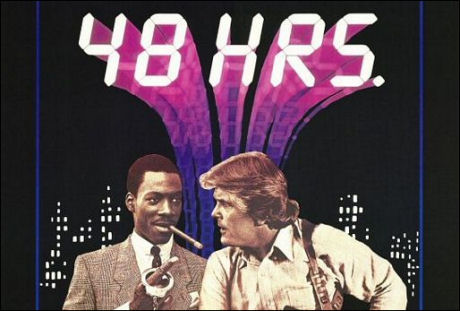Except that this 1940 title card has…I don’t know, a vibe. The starkness, the shadows, the monochrome sheen, the deco moderne lettering, the odd sideways markings on the road, the fake authenticity of it.
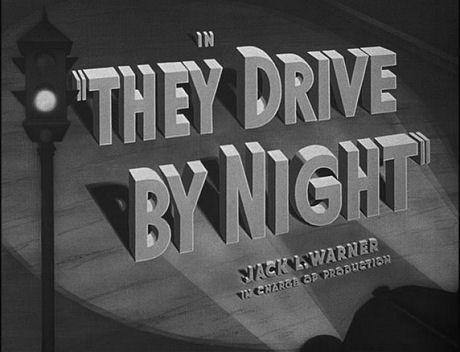
Except that this 1940 title card has…I don’t know, a vibe. The starkness, the shadows, the monochrome sheen, the deco moderne lettering, the odd sideways markings on the road, the fake authenticity of it.

Fantasy Moguls‘ Steve Mason is reporting that even though Will Smith, Akiva Goldsman and Peter Berg‘s Hancock was “flat” from Wednesday-to-Thursday with an estimated $17.1 million and a 2 1/2 day cume of just over $41 million, it’s nonetheless on target for $100 million over the 5 and 1/2 day holiday weekend. But I say no to that.
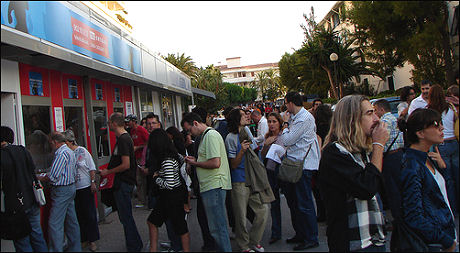
The truth is that Hancock‘s ticket sales yesterday should have been more than its Wednesday business, which was estimated at $17.3 million. Instead it did $17.1 million — flat-ass. A movie that’s really happening with the public would have jumped to $19 or $20 million yesterday. This tells you the word on the street (i.e., that the third act is an out-and-out disaster) is probably catching up with it.
July 4th is always a dead day, so Saturday’s business will tell the tale. But I’m figuring Hancock will do $80 to $90 million by Sunday night. And if this happens, anyone who reports that figure as an absolute box-office triumph will be less than honest in their assessment. Not that $80 to $90 million is anything to sniff at. It’s just that you can’t expect sales to be rocket-ship historic if the dogs don’t like the dog food. If you make a movie that goes completely insane and blows itself up in the third act, sooner or later people will realize this and respond accordingly.
Kit Kittredge, sad to say for Picturehouse/NewLine, is a flat-out disaster. It did about $1.1 million on Wednesday in 1700 theatres, averaging $600 a theatre. And it $900,000 on Thursday for a $500 per theatre average. Complete wipe-out. Mason pussyfoots by saying it’s “unlikely to top $10 million” by Sunday night. Gee, do ya think so?
Seeing Hellboy II the other night reminded me that the films of Guillermo del Toro are as good as it gets in the fantastical horror realm. They’ve got first-class effects, wit, invention, soul, visual economy, emotional gravitas. The monsters are beautifully particular, the performances have warmth and authority, and the camerawork and the cutting are grabby and fast but this side of hyper.
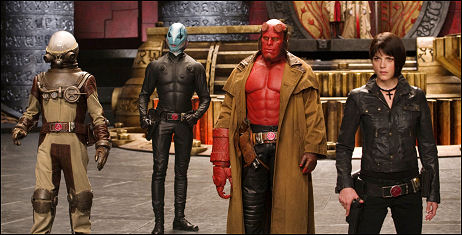
The problem is this, and it’s not so much Guillermo’s fault as the action-fantasy genre: I’m sick to death of watching stuff getting wrecked and smashed and shattered and blown into a million pieces. I hate the rigid big-studio FX formula that insists upon confrontation and chaos and ruination happening ever 20 or 30 minutes, like some stupid whammy chart. Windows exploded, buildings decimated, cars doing aerial triple-flips, fire hydrants spewing tons of city water, industrial clutter everywhere….what the fuck is this? It’s the same shit in every movie, and it vacuums your soul.
What kind of cretin do you have to be to find this stuff interesting after it’s been repeated 25 or 30 times? How many times can the dumbest moviegoer out there go “whoa!” after seeing a super-hero wallop a slime-covered monster and send it flying several hundred yards into a building or a wall of glass or a concrete bunker, or vice versa? How many times can the hero take a severe beating to the extent that it looks like he’s finished? How many times can a slithering disgusting alien creature try to eat or invade or flatten the heroes? How many times can a moron with a extra-large tub of popcorn in his lap be impressed with loud aural thumpings on the soundtrack?
Guillermo does everything he can to add feeling and humor and humanity to Hellboy II, and he succeeds nicely from time to time, but he’s working within a genre that insists upon showing the same shit over and over, no matter what and no end in sight.
I never thought I’d say this, but in this context I’m a Barry Manilow type of guy. I mean that I loved (okay, liked) the sequence in which Ron Perlman‘s Red and Doug Jones‘ Abe Sapien drunkenly sing along to Manilow’s “Can’t Smile Without You.” And I’m a pretty big fan of Tecate beer. And I liked the bit with Perlman protecting the baby from the madness and other stuff along these lines.
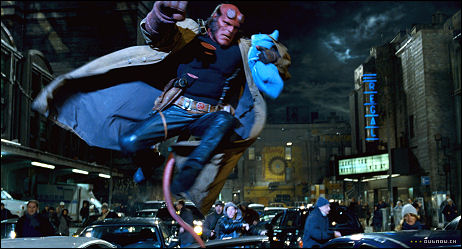
I’d much rather see a televised dramedy series starring Red, Abe, Selma Blair‘s Liz Sherman, Jeffrey Tambor‘s Tom Manning and all the rest of the Del Toro freaks and eccentrics, and made into a kind of Everybody Loves Raymond type deal with monsters showing up maybe once every five or six episodes. If that. Because I really can’t stand watching shit being blown up any more. How can people can sit through the same demolition derby in film after film, over and over, year after year? It’s insane.
Guillermo knows that I’m much more of a Chronos/Devil’s Backbone/Pan’s Labyrinth/The Orphanage type of guy and that I just can’t roll over for the big-studio stuff. It’s always been a big problem for me.
One technical beef: when the giant land-squid monster picks up a Mercedes Benz and squeezes it to death, we should see gallons of gasoline gushing out. Are we supposed to think that the car had no gas in it? I didn’t believe it. Maybe Guillermo can fix this effect for the DVD version.
I can’t remember the last time I’ve taken such an instant dislike to an actor as I have to Josh Peck, star of The Wackness (Sony Classics, 7.4 in N.Y. and L.A.) It’s lazy to do this, but I can’t express it any better than I did last April: “Peck obviously does well at playing young urban white guys who talk in a street argot that is part imitation ‘black’ and part whatevuh,” I wrote last April, “but in any case suggests a total inability to convey an air of refinement and higher education.
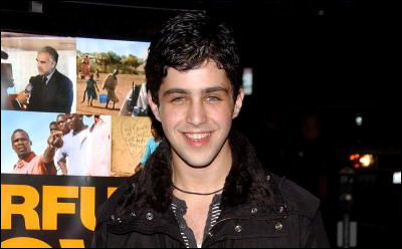
“Is there any circumstance in which any casting director, no matter how whacked, would use this guy to play a small-town cop in Oregon, an assistant to a U.S. Senator, a young suburban dad, a used-car salesmen from Cranford, New Jersey, or anything other than a what-up homie who sells tabs of ecstasy and dilaudid in Tompkins Square Park?
“In other words, Josh Peck is basically Leo Gorcey. Nothing wrong with that, exactly, except that he has one trick and one rap and thassall.”
I can’t embed this Channel 4 promotional ad for a series of Stanley Kubrick films they’ll be showing, but it’s ingenious — a carefully choreographed, superbly designed and exquisitely cast tribute to The Shining. The sets, the haircuts, the mood of it…perfect! Except I can’t find the actor playing Kubrick or Jack Nicholson. I guess I need to watch it a few more times. (If it’s embedded somewhere, please send along the code.)
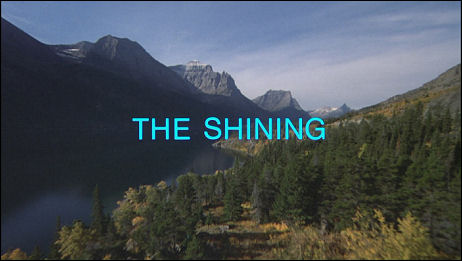
“Channel 4 has painstakingly recreated the set of Stanley Kubrick horror film The Shining,” the story reads, “complete with look-a-likes of the crew and cast members including Shelley Duvall, for a TV ad to promote a More 4 season of the director’s films.
“The 65-second promotional spot has been filmed as a one-take tracking shot through the recreation of The Shining.
“Viewers get Kubrick’s point of view as he walks through the set, ending up in his director’s chair as the crew prepare to shoot the famous scene of Danny Torrance, the son of Duvall and Jack Nicholson’s characters, riding round and round the deserted corridors of the Overlook Hotel.
“The promo, filmed as a single tracking shot with a cast of 55 actors, was meticulously researched to ‘remain as faithful as possible to the period in which it was shot and the culture of the British studio in the late 1970s”.
I’m sorry, but Meryl Streep‘s use of the word “miasma” in the previous story reminded me of the character named “Miasmo” in Peter Yates‘ The Hot Rock (’71), and that led to finding this scene on You Tube. Hands down, it’s the best acted and most convincing dumb hypnotism scene in the history of American cinema.
In an interview with The Guardian‘s Stuart Jeffries, Mamma Mia! star Meryl Streep has more or less said that the reason she’s starring in this new movie musical is because of the roundabout influence of Osama bin Laden and the 9/11 attacks. More particularly because of the effect that a matinee performance of Mamma Mia! on the Broadway stage had upon a group of 10 year-olds, including her daughter Louisa, not long after the attacks.

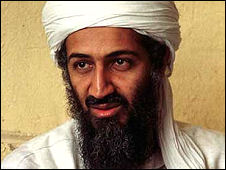
I knew there was unusual left-field reason why Streep would star in a movie version of an ABBA stage musical! I knew it and now it makes sense.
It was seven years ago and Streep “was in a bit of a pickle,” Jeffries writes. “She had to dream up an excursion for some friends of Louisa, the youngest of her four children by husband Don Gummer, the sculptor to whom she has been married for the past 30 years. Only one problem: it was October 2001 in Manhattan.
“‘Everybody was really dimmed spiritually after 9/11,’ Streep relates. ‘I thought, ‘What am I going to do with the kids?’ So I took all these 10-year-olds to see a matinee of Mamma Mia!. They walked in and they sat there with their heads in their hands. Dimmed is the word. They were sad all the time, you know?
“‘The first part was really wordy, and then ‘Dancing Queen’ started up. And for the rest of the show they were dancing on their chairs and they were so, so happy. We all went out of the theatre floating on the air. I thought, ‘What a gift to New York right now!’ She sent a thank you letter to the cast.”
And that opened Streep’s emotional receptivity door and down the road she was offered the part. In other words, Streep became a Mamma Mia! fan for the same reason that some journalists fell big-time in love with Amelie at the 2001 Toronto Film Festival — i.e., because it was shown right after the attacks and put them in a much better mood. Another way to put it is that Streep joined the Mamma Mia! team for the same reason that Ron Silver became a Republican. Oh…my….God!
“Isn’t this role beneath you?” Jeffries asks. “I’m not strategizing my career moves at all,” Streep replies. “I haven’t got a career that I’m building. When I swim my 55 laps, I try to remember the movies I’ve been in order, and I can’t…the past is just a miasma. There’s no career path.
“I just want to do things that are valuable to introduce into the culture,. This film [Mamma Mia!] is a valuable thing. I knew it when I saw it.”
God grant me (a) the serenity to accept the bad movies I cannot stop from being made that I will probably wind up seeing anyway because I have to try and stay current because I write a daily column, (b) the courage to refuse to see the really bad films that come along that are truly bad for your soul, like Wanted, and (c) the wisdom to know the difference.
Some Came Running‘s Glenn Kenny feels that a certain James McAvoy line in Wanted — “Six weeks ago, I was ordinary and pathetic, just like you” — indicates that screenwriters have contempt for their audience. “What is this bullshit?,” Kenny asks. “”Have screenwriters become so defensive /resentful on account of churning out quasi-nihilistic, faux-convoluted, graphic-novel-mytho-Babel tripe like this that they feel compelled to lash out at the audience that laps their nonsense up?” Uh, yeah…kinda.
A gaffe, as Michael Kinsley famously wrote, is when you blurt something out that everyone knows to be true (like Samantha Power calling Hillary Clinton a “monster”) but which you’re not allowed to publicly acknowledge. And in a way, Kenny seems to be saying, that Wanted line is a kind of screenwriter’s gaffe — a confession of loathing for the unwashed masses that kind of “slipped out” and wound up in the Wanted screenplay. (Which is attributed to Michael Brandt, Derek Haas and Chris Morgan.)
The Hollywood elite, trust me, think very little of ticket-buyers in general. Once you’ve made it to a certain level in the film industry and have begun to run with the truly cool and connected and earn serious dough, you don’t relate to average stiffs. Big Talent tends to look upon regular moviegoers as prisoners of a sort, living in a comfortable penal colony that allows them to indulge in all kinds of perks but keeps them prisoners all the same. (You know…like the way things are in The Matrix.) I’m sorry if this sounds cruel.
Talk to talent on E.T. or Extra about the fans and they’ll go “we love ’em all!” — but that’s public relations. Remember John Lennon‘s lyric about how “you’re still fucking peasants as far as I can see”? That was another “uh-oh…a celebrity just said what he should have kept quiet about.” The real truth about things only comes out when someone is tired or arrogant or involved in primal-scream therapy and the obiter dicta — the words in passing — just tumble out.
I was doing an interview in 1982 with actor Paul Land, who played the “Tommy Dee” character in Taylor Hackford‘s The Idolmaker. Land, whose people skills weren’t that great, was talking about his life before he became a successful actor, and he said at one point, “I was like you back then!” Me, he meant — a low-rent schlub, struggling to survive. I understood what Land was basically saying and I didn’t take offense, but the publicist in the room noticably stiffened and went “aaahh.”
I now have good reason to doubt Glenn Erickson‘s review of the Blu-ray Dirty Harry disc that I linked to and commented about yesterday. Erickson was cool with Fox Home Video’s controversial Patton Blu-ray disc, but has claimed that the Dirty Harry disc shows “heavy tweaking to minimize grain, sharpen contrast and brighten colors” and that “heavy processing has given most night shots an almost unnatural look.”
The reason is that transfer guru and unrequited grain-worshipper Robert Harris doesn’t agree, and neither, according to a well-placed source, does Clint Eastwood himself. Harris says that the Harry disc looks like beautifully restored film and not digital data (unlike, in his opinion, the case with the Patton disc). And an on-the-lot source has told me that Eastwood approved the Blu-ray transfer during a test screening late last year.
Eastwood “came in to watch the first ten minutes, said it was fine, and then got up, went to the back of the room, sat down and watched the whole thing,” the source says. “The only grain reduction was done to even out the grain structure. We also toned down a blood scene so it wouldn’t look so day-glo red.”
The trailer for The Day the Earth Stood Still (20th Century Fox, 12.12) with Keanu Reeves (as Klaatu), Jennifer Connelly, Kathy Bates and John Cleese. Directed by Scott Derrickson, written by David Scarpa. I copied the code from some Russian site called Ru Tube. YouTube had it up for a bit before it was pulled. It probably won’t last very long here also. It’s also watchable on this fan site.
Scarpa’s script may, I’m reading, be based more closely on Harry Bates‘ 1940 short story called “Farewell to the Master” than the classic 1951 Robert Wise film with Michael Rennie, Patricia Neal, Billy Gray and Sam Jaffe. Don’t read the Wikipedia synopsis of the short story if you don’t want to know.
During a q & a session following a Los Angeles Film Festival showing of Boogieman, the superb Lee Atwater doc, I asked a question about the differences in the political climate of 20 years ago (i.e., during the Bush-Dukakis presidential race) and today, and said that I don’t think that racial attitudes are quite as fearful and retrograde as they seemed to be in ’88. I was obviously referring to the Obama ascendancy, but some in the audience flat-out laughed at me for saying this.
The night before last I happened to watch 48 HRS. (’82), the seminal action buddy movie with Nick Nolte and Eddie Murphy as a cop and a con kicking around San Francisco and looking to stop some bad guys. I was surprised how…yesteryear it felt.
And I’m telling the snooties who laughed at my political naivete a couple of weeks ago that the racial attitudes and undercurrents in this Walter Hill movie, which came out 26 years ago, have all pretty much disappeared in Blue America. They give you a taste of a racially-biased and separatist culture that no longer exists in this country, or is at least severely diminished, and would never be represented in an action film made today.
Nolte is a flat-out racist brute who calls Murphy “nigger” and “spear-chucker.” They go into a redneck bar that’s supposed to be some kind of haven for good ole boy white separatism (in San Francisco?), and when Murphy walks in the vibe in the room is like, “Holy shit, a black guy!” When Murphy order a drink the bartender goes, “How about a Black Russian?” Can anyone imagine material of this sort turning up in any movie made today? Even one set in Bumblefuck, Idaho?
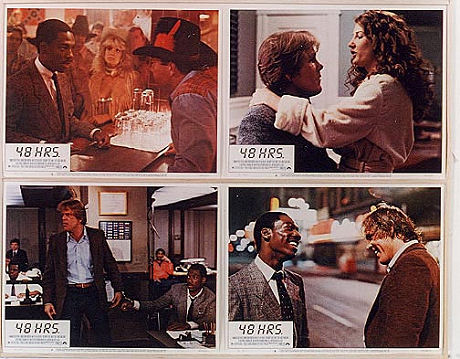
48 HRS. is about Nolte and Murphy seeing beyond their personal petty crap and coming to like and respect each other for who they are inside, but the fact that Hill and his writers toss in the racial jibes tell you something about the culture back then.
Attitudes were still fairly ugly in some quarters. The hosing of the civil rights demonstrators in Selma, Alabama, had happened only 17 years before, or what 1991 is to us today. Ours was a reasonably progressive society in elite media circles (Bryant Gumbel began his Today stint in January 1982, and Bernard Shaw had begun as a CNN anchor two years earlier) but Nelson Mandela wouldn’t be released from Robben Island prison until 1990.
I was around and I don’t remember anything in the early ’80s like the comme ci comme ca homogenous whatever vibe that you feel today. In the blue cities and upscale suburbs, I mean. Maybe my memory is faulty, but I don’t think so. The flannel-shirt dumb-asses are obviously still out there in force (they obviously kept Hillary’s campaign going in the final stretches of the Democratic primary race), but things have definitely evolved and progressed since the early Reagan era.
